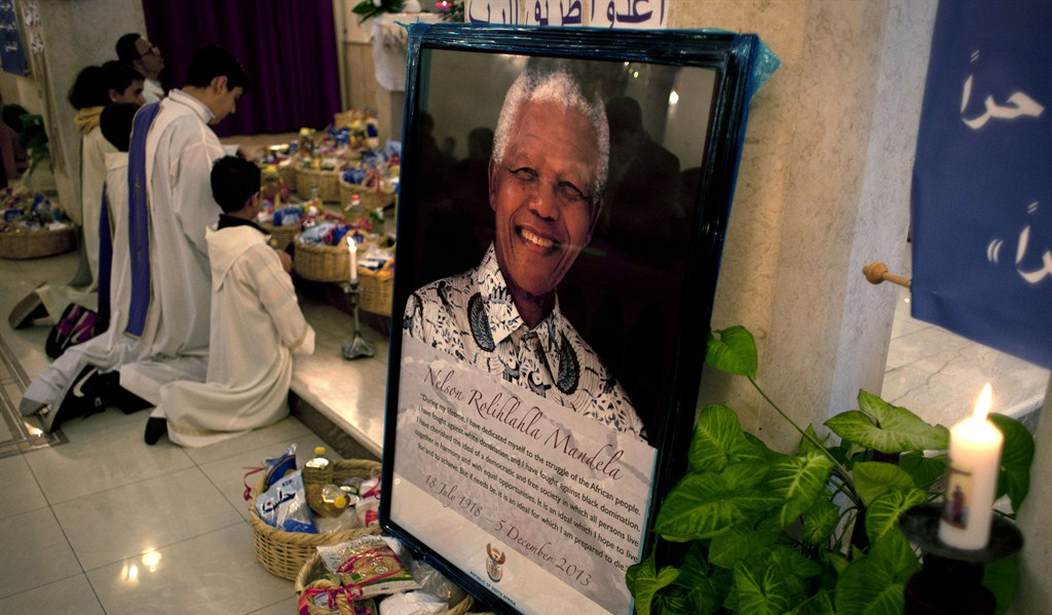Without a doubt, Nelson Mandela was one of the towering figures of our times, a man who became a legend and cultural icon while still alive. Now that he is dead, his detractors are demonizing him while his followers are canonizing him.
Senator Ted Cruz was quick to find this out after he issued a
Who then was the real Nelson Mandela?
According to President Obama, “We have lost one of the most influential, courageous, and profoundly good human beings that any of us will share time with on this Earth.”
In the words of Bono, “Stubborn til the end for all the right reasons, it felt like he very nearly outstared his maker. Today, finally, he blinked. And some of us cry, knowing our eyes were opened to so much because of him.”
According to U.K. Prime Minister David Cameron, Mandela was “a hero of our time,” stating that, “A great light has gone out in the world.”
But World Net Daily’s Joseph Farah urged us not to mourn for Mandela, writing that “He was a committed member of the South African Communist Party. He was a leader of the revolutionary African National Congress, which he helped to radicalize into an organization sworn to armed, violent attacks.” And while he overthrew the evil system of apartheid, “Mandela’s revolution brought about . . . one in which anti-white racism is so strong today that a prominent genocide watchdog group has labeled the current situation a ‘precursor’ to the deliberate, systematic elimination of the race.”
Recommended
In short, Farah argues, we have been sold a myth about Mandela (think “Invictus”), in support of which he quotes Sonia Hruska, “an early supporter of Mandela” who “worked in his administration.” She states that, “After about six years, I realized something serious is wrong; the communist elements are taking over, it’s not what we were promised.”
Farah adds that, “Hruska describes routine, violent, racist atrocities of almost unimaginable proportions: Kidnap murders, home invasions, gang rapes.”
CultureWatch blogger Bill Muehlenberg also has strong reservations about Mandela, citing South African missionary Dr. Peter Hammond who notes that “Mandela was the head of the military wing of the African National Committee (ANC),” which Hammond referred to as “the abortion, necklacing and corruption party.” According to Hammond, “1,000 Africans were killed by necklacing in the country through the ANC, an act where terrorists would ‘put an automobile tire over someone, pour petrol over them [and] set them alight.’
“Hammond also described numerous other acts of violence that he alleges were committed by the ANC under the order or oversight of Mandela. ‘Missionaries and their kids [were] murdered, bayonetted on the fields—whole families killed by landmines planted in the roads,’ he said.”
And it is without dispute that Mandela signed off on acts of terror against the apartheid government, to the point that even the New York Times tempered its praises for Mandela.
Yet it is hardly a violent terrorist who states, “For to be free is not merely to cast off one's chains, but to live in a way that respects and enhances the freedom of others.”
And on a Facebook post, Messianic Jewish scholar Stuart Dauermann wrote, “I read his biography ‘Long Walk to Freedom’ and was particularly struck by his extraordinary self-control. When he was negotiating with the leaders of the Apartheid government which had so demeaned and oppressed him and all South African blacks, he writes that he utterly despised these people. Yet he learned their language, Afrikaans, and spoke to them respectfully because he judged it was more important for him to win freedom for all South Africans than it was for him to tell these men what he thought of them. All of this after 27 years of demeaning and cruel imprisonment on Robin Island where the white prisoners wore long trousers, but the blacks were required to wear shorts, as if they were children.”
Others would point out that despite his acts of terror, Mandela was never tortured in prison and did not renounce violence against the government while a prisoner, yet there’s no denying the evil he opposed and there’s no denying the courageous stands he took.
When facing the death penalty in 1964, he famously said, “During my lifetime I have dedicated myself to this struggle of the African people. I have fought against white domination, and I have fought against black domination. I have cherished the ideal of a democratic and free society in which all persons live together in harmony with equal opportunities. It is an ideal which I hope to live for and to see realised. But if needs be, it is an ideal for which I am prepared to die.”
In short: 1) He was a man who resorted to acts of violence and terror to overthrow injustice; 2) He was a man who stepped into the role of national and international statesman with dignity; and 3) He was a man who was more communist than conservative and whose legacy in South Africa remains mixed.
While the assessment of Muehlenberg is meant to be simple rather than profound, it appears to be accurate: “Mandela was a great man in some respects, but he was also an evil man in some respects.”
Do you concur?

























Join the conversation as a VIP Member